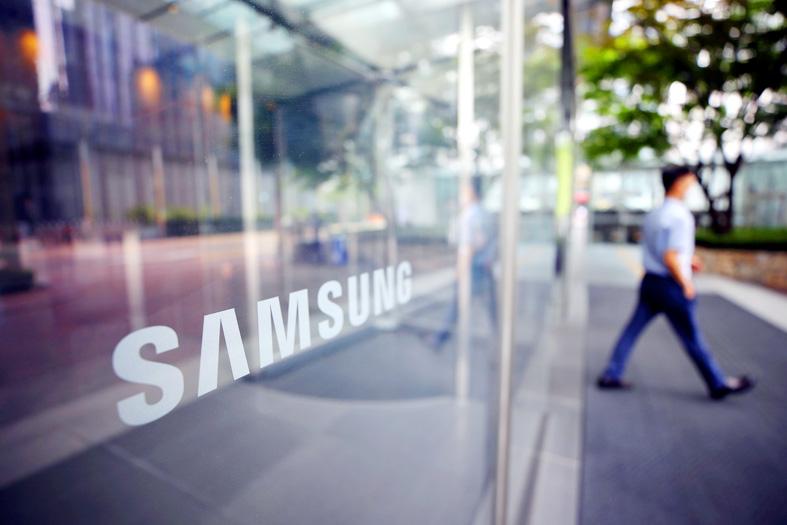Samsung Electronics Co’s net profit surged more than 70 percent in the second quarter thanks to higher memorychip prices fueled by demand spurred by the COVID-19 pandemic, the South Korean tech giant reported yesterday.
Pandemic-driven working from home boosted demand for devices and appliances powered by Samsung’s memory chips.
The company said that “memory shipments exceeded previous guidance and price increases were higher than expected.”

Photo: EPA-EFE
The world’s biggest smartphone maker saw net profit rise 73.4 percent year-on-year to 9.6 trillion won (US$8.38 billion) for April to June, the company said in a regulatory filing.
Operating profit increased 54.3 percent to 12.6 trillion won from 8.1 trillion won a year earlier, more than half of which came from the firm’s semiconductor business.
The strong results come despite a quarter-on-quarter decline in Samsung’s earnings from its smartphone business because of supply chain problems that disrupted global production.
“Samsung will benefit from memorychip prices that are likely to go higher in the third and fourth quarter,” Cape Investment & Securities analyst Park Sung-soon said.
The firm anticipates favorable market conditions for the rest of the year, with continued demand for memory chips in the server and mobile markets, but it warned that pandemic-fueled uncertainty would persist in the second half, citing “continued disruptions in component supply.”
Samsung is expected to showcase the latest foldable smartphone models of its Galaxy Z and clamshell Galaxy Z Flip next month. The upcoming gadgets would be equipped with “new multitasking capabilities and enhanced durability,” said T.M. Roh, head of Samsung’s mobile communications business.
Samsung aims to solidify its position in the smartphone market “with the rollout of its premium mobile lineups as well as cheaper models in the third quarter,” said James Kang, senior analyst at Euromonitor International.
The company could face headwinds next year, as consumer demand is likely to be weaker than this year, Kang said.
Samsung also faces legal challenges. Its leader, Jay Y. Lee, is on trial, charged with manipulating a takeover to smooth his succession at the top of Samsung Group.
Lee was separately jailed in January over a sprawling corruption scandal that brought down former South Korean president Park Geun-hye. He is eligible for parole next month after completing more than half of his two-and-a-half year jail term.
Meanwhile, LG Electronics Co, South Korea’s second-largest appliance firm after Samsung, posted a 65.5 percent jump in operating profit for the second quarter, to 1.1 trillion won.

STEEP DECLINE: Yesterday’s drop was the third-steepest in its history, the steepest being Monday’s drop in the wake of the tariff announcement on Wednesday last week Taiwanese stocks continued their heavy sell-off yesterday, as concerns over US tariffs and unwinding of leveraged bets weighed on the market. The benchmark TAIEX plunged 1,068.19 points, or 5.79 percent, to 17,391.76, notching the biggest drop among Asian peers as it hit a 15-month low. The decline came even after the government on late Tuesday authorized the NT$500 billion (US$15.2 billion) National Stabilization Fund (國安基金) to step in to buoy the market amid investors’ worries over tariffs imposed by US President Donald Trump. Yesterday’s decline was the third-steepest in its history, trailing only the declines of 2,065.87 points on Monday and

TAKING STOCK: A Taiwanese cookware firm in Vietnam urged customers to assess inventory or place orders early so shipments can reach the US while tariffs are paused Taiwanese businesses in Vietnam are exploring alternatives after the White House imposed a 46 percent import duty on Vietnamese goods, following US President Donald Trump’s announcement of “reciprocal” tariffs on the US’ trading partners. Lo Shih-liang (羅世良), chairman of Brico Industry Co (裕茂工業), a Taiwanese company that manufactures cast iron cookware and stove components in Vietnam, said that more than 40 percent of his business was tied to the US market, describing the constant US policy shifts as an emotional roller coaster. “I work during the day and stay up all night watching the news. I’ve been following US news until 3am

Six years ago, LVMH’s billionaire CEO Bernard Arnault and US President Donald Trump cut the blue ribbon on a factory in rural Texas that would make designer handbags for Louis Vuitton, one of the world’s best-known luxury brands. However, since the high-profile opening, the factory has faced a host of problems limiting production, 11 former Louis Vuitton employees said. The site has consistently ranked among the worst-performing for Louis Vuitton globally, “significantly” underperforming other facilities, said three former Louis Vuitton workers and a senior industry source, who cited internal rankings shared with staff. The plant’s problems — which have not

TARIFF CONCERNS: The chipmaker cited global uncertainty from US tariffs and a weakening economic outlook, but said its Singapore expansion remains on track Vanguard International Semiconductor Corp (世界先進), a foundry service provider specializing in producing power management and display driver chips, yesterday withdrew its full-year revenue projection of moderate growth for this year, as escalating US tariff tensions raised uncertainty and concern about a potential economic recession. The Hsinchu-based chipmaker in February said revenues this year would grow mildly from last year based on improving supply chain inventory levels and market demand. At the time, it also anticipated gradual quarter revenue growth. However, the US’ sweeping tariff policy has upended the industry’s supply chains and weakened economic prospects for the world economy, it said. “Now